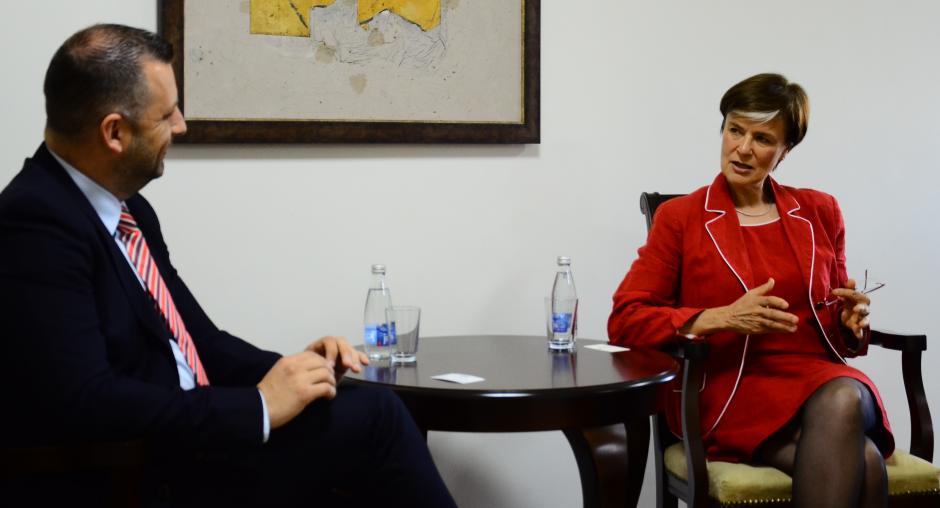Language rights, participation, security and access to justice fundamental to welfare of communities in Kosovo, says High Commissioner Thors

During her visit to Kosovo from 7 to 10 June 2016, the OSCE High Commissioner on National Minorities Astrid Thors focused on education, implementation of the framework of language rights and access to justice.
The High Commissioner continues to urge for the adoption of the Strategy for the Protection and Promotion of Language Rights, contending that it will make the implementation of legislation more efficient and improve the quality and the consistency of different language versions of legal acts. “When in place, the strategy will lead to positive results quickly,” said Thors.
The visit included Prishtinë/Priština, Mitrovicë/Mitrovica, Prizren, Janjevë/Janjevo and Gračanica/Gracanicë where Thors met with ministers, local authorities, media representatives, judges, university professors and students, as well as representatives of the international community. The High Commissioner was joined in several meetings by the Head of the OSCE Mission in Kosovo Jean-Claude Schlumberger.
Thors commended the recent adoption of an administrative instruction of the Ministry of Education Science and Technology, which will make it easier for members of non-majority communities to pursue studies at universities in Kosovo as it, among others issues, improves the functioning of the existing quota system.
Whilst visiting the University of Prizren, the High Commissioner expressed concern that courses taught in Turkish and Bosnian have not yet received official accreditation for the next academic year. Such courses cater to the fundamental needs of non-majority communities in Kosovo. “I encourage relevant authorities to take urgent measures so that these options remain available also the next academic year,” said Thors.
High Commissioner Thors discussed extensively with a number of stakeholders the prospective establishment of the Association/Community of Serb majority municipalities as well as ways to overcome the current stalemate in the process. She heard views on the need to respect the relevant legal framework but also to meet the expectations of concerned communities, in north Kosovo as elsewhere. Thors also noted the concerns expressed by Serbs living outside Serb majority municipalities, as well as non-Serb non-majority communities, who fear they will not benefit from the process.
In several meetings Thors pointed to the need to improve access to justice for all non-majority communities, to thoroughly follow up on crimes targeting them, as well as to fully enforce their property rights. “When such crimes are investigated and prosecuted, it sends a powerful and reassuring message to non-majority communities that their rights will be effectively protected by the authorities.”
On the last day of her visit, Thors attended a class of Serbian language instruction for Kosovo Albanian officials from the municipality of Prishtinë/Priština, part of a flagship partnership project on language acquisition by municipal officials sponsored by the Office of the Language Commissioner and the HCNM, with German funding, and implemented by the ECMI Kosovo.
The visit served to underline the importance attached by the High Commissioner to language learning as a key building block for integrated societies: “Speaking more than one language is beneficial, both for the person who speaks them and for society as a whole; it is even more important for local government officials, who regularly engage with members of public, to be able to communicate with every person in their community.”
